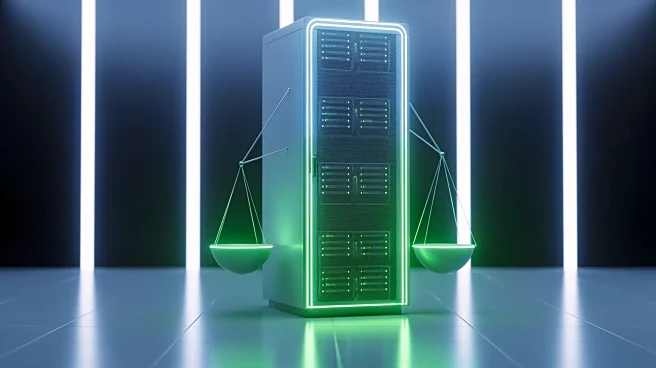What's Happening?
Florida utility regulators are currently evaluating how to manage the impact of data centers on electricity costs. These facilities, which house computer equipment essential for artificial intelligence
and other technologies, have significantly increased power bills in other regions due to the need for utilities to expand infrastructure. Florida Power & Light has proposed a rate hike to collect nearly $10 billion over four years, including a plan to require tech companies to pay a minimum bill representing 90% of their expected energy costs. This proposal aims to prevent residents from bearing the cost of infrastructure expansion if data centers consume less energy than anticipated. However, consumer advocates have opposed the proposal, leading to a settlement offer that reduces the rate increase to $7 billion and lowers the minimum bill requirement to 70%. The hearings on this matter are ongoing, with a decision expected by the end of the year.
Why It's Important?
The decision by Florida utility regulators could set a precedent for how data centers are managed in terms of energy costs, impacting both businesses and residents. If the proposal is accepted, it could attract more data centers to Florida, potentially spreading costs among a larger user base. However, consumer advocates argue that the settlement favors large businesses and could lead to higher costs for residential customers. The outcome of this case could influence similar decisions in other states, affecting the balance between encouraging technological growth and protecting consumer interests. The involvement of major tech companies and the stance of political leaders like Governor Ron DeSantis highlight the broader implications for public policy and economic development.
What's Next?
The hearings are set to conclude soon, with regulators expected to make a final decision on the rate hikes by the end of the year. The decision will likely impact future negotiations and policies regarding data centers and utility costs in Florida. Stakeholders, including tech companies and consumer advocacy groups, are closely monitoring the proceedings, which could influence their strategies and investments in the region. The outcome may also prompt legislative or regulatory changes to address the balance between technological advancement and consumer protection.
Beyond the Headlines
The case raises ethical questions about the responsibility of tech companies in managing their energy consumption and the potential burden on residential customers. It also highlights the challenges of integrating new technologies into existing infrastructure without disproportionately affecting certain groups. The decision could lead to long-term shifts in how utilities approach rate structures and the role of data centers in local economies.









